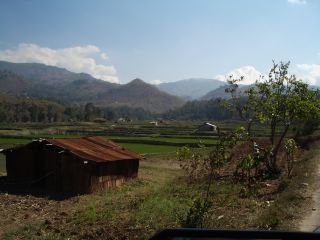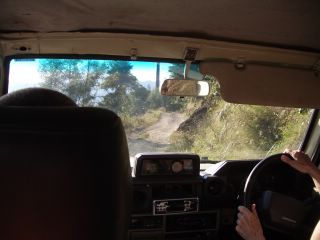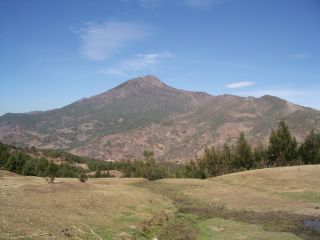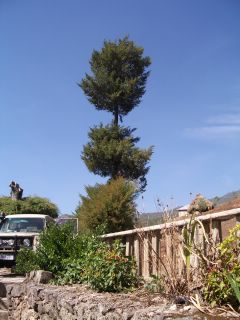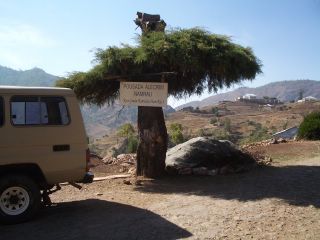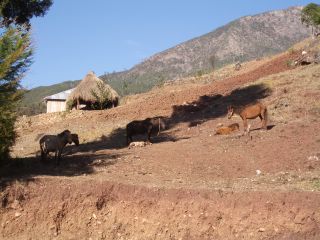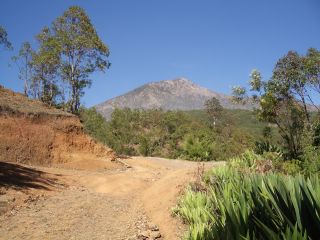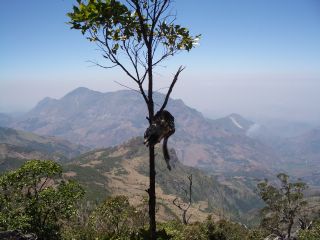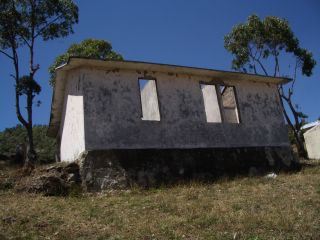Friday 28 October 2005
We experienced our first visit to a Timorese home on Sunday. My friend Zelia had invited us over for lunch and she just happens to live in the same village/suburb as we do. Upon arrival, she introduced us to her uncle and two “brothers” (extended family) with whom she shares a house. She is the only female member living there and I worry that she is expected to take care of them all (cooking, cleaning, washing etc). We sat outside the house with the three Timorese men, while Zelia prepared morning tea. We managed a more than brief conversation with them in Tetun. For morning tea, Zelia offered us watery rice porridge as a drink in a cup (standard breakfast fare in Timor) and “hudi sona” (fried bananas) purchased locally for 5c a piece. Not long after, two of the men had to leave to complete the business of selling buffalo and cattle, which is how they make their living. Prior to lunch, one of the “brothers” expertly climbed the coconut tree in their garden and plucked for us two green coconuts. He then cut them open with a machete and we drank the juice and ate the meat although I found the juice too bitter. Also in their garden, were “hudi” (banana) and papaya? trees. For lunch, Zelia cooked for us on an open wood fire stove, white rice, a green leafy vegetable and spicy noodles at which point another uncle joined us for lunch. The food was very tasty although I was glad I did not have to eat it every day, as it is rather monotonous. However, Zelia said that compared to Lautem district where she originates from, the food available in Dili is more varied which she prefers. After lunch, Zelia was talking to us and said that she wanted to ask us something. She went very quiet and was so nervous that she said she felt sick in the stomach. I suspected that she was about to ask us for money. She took a while to speak but when she did, she broke down and cried while she asked if we could purchase her an English dictionary and word translator calculator from Bahasa to English to assist her in her university studies as an English major. I felt for her, as the courage it obviously took for her to ask us was palpable. We tentatively agreed depending on the price of the items. It looks as if each item will cost around $50 so we have suggested to her that she thinks about which item would be of more use to her in her studies. We have also decided to continue offering her some financial support in order that she can complete her degree. We will be her patrons of sort. Her parents are poor subsistence farmers. I have talked about Zelia’s family in a previous post (see M is for Mikrolets, Mosquitos, Men and Marriage).
I attended a security briefing at the Australian Embassy in mid October. I was able to ask questions of the AusAid officer concerning the development scholarships that are offered to the Timorese. Apparently, AusAid use to offer more but found that because the difference in education standards was so great, that many of the Timorese students simply dropped out or reduced their qualifications down to TAFE level. Thus they are only offering between 6 to 10 scholarships a year and with approximately 1000 Timorese applying, each person’s chance of success is very small. Thus, I do not think given Zelia’s level of English that she will secure such a scholarship. Hence, we have decided to support her financially in Timor. Her university fees are $60 a year plus books. We believe that we can afford to offer this support as we do have some money left over from our living allowance and she is a woman trying to make a better life for herself in an incredibly poor and patriarchal society. We have come to see first hand the importance of education, particularly for women and are simply putting our money where our mouth is.
Daniel came across an email list of a Peace Corp (USA) volunteer currently living in a village in Lautem district (the farthermost eastern district where Los Palos is the capital and where my friend Zelia originates). Part of this particular post is worth replicating here to give more weight to the issues I have been addressing in my posts, and which consumes my working day.
Tuesday 25 October 2005
The thought of trying to recap my first month as an actual volunteer is slightly overwhelming ... I'm not exactly sure where to begin. This email may be a little jumpy, here and there, so I'm apologizing in advance.
I guess the best place to start is with my host family. This has proven to be my greatest challenge so far. Going into site, my host apa said that he was going to "adopt" me and treat me as his daughter. This sounds great on paper, but you have to remember that I'm in East Timor and the status of women here is pretty low. I'm currently getting just a little taste of what it's like to be female here, and ladies, be glad that you were born in the U.S.
The first week I was at site I got a little taste of what was to be in store for me in the upcoming months. I had 2 sisters who were living with me at the time, but were to leave in 2 weeks. My apa said to me, "When you're sisters leave, you and your ama will be the only 2 females in the house. You'll have to cook, clean, and fetch water. And if you don't cook, we won't eat! Because you're the only females in the house!"
Since my sisters have left I do quite a bit of work in the house. Every morning I wake up between 5:30 and 6, sweep the floors, do the dishes from the night before, either start a fire and boil water or go fetch water, and help prepare breakfast. Then I have to wait for my apa to come and eat before I start eating. Throughout the day fetching water is also part of my routine. I've learned how to carry water on my head using a basket, so now I can carry 4 jugs of water at a time. This is about 20L per trip, and I make 2-3 trips a day. For lunch I just help set the table, but I have a more involved hand in cooking dinner. Every night I start a fire, clean and cook the rice, cut the vegetables and prepare to cook them, set the table, and do the dishes from lunch.
Reading back over this it doesn't sound like all that much work, but you have to remember that I have none of the conveniences of the technology of home. And cooking over a fire is hot. I think that I would have no problem at all doing this work and more if it wasn't for my host father. Besides the fact that he barely does any work in the house, he's taken to telling me what to do and ordering me around. Just a few examples:
- go clear the table (after him and his buddies finished eating)
- go bring my chair in from outside
- have you started cooking yet? you need to cook faster
- bring me and my friends some cups (while they sat outside and drank tua, the local palm wine)
He's also had a conversation with me about how plates and spoons are women's friends. He actually used the word "friend." He told me that a woman can study and go to school and be a surgeon, but plates and spoons are still her friends. He also said that he doesn't know how to cook, just eat. He asks me to do things or if the food is ready on a daily basis, I think to show his dominance over me. It's quite annoying, and needless to say I'm moving out as soon as possible. I say horrible horrible things about him daily under my breath. But I'm learning to deal with it. I'll be out in a couple of months, and it's a good learning experience about what females actually put up with here. I suppose. Certainly I could do without it.
In support of the PeaceCorps volunteer’s experience as a woman in a rural village where 80% of the population live, this chart is illustrative of the burden of work women bear in Timor.
Division of labour in a farming household
Building house etc, Men
Land preparation, Men
Carrying corn and rice, Men
Selling rice and cattle, Men
Tending cattle, Men and children
Weeding, Men, women and children
Firewood, Men, women and children
Food preparation, Women
Cooking meals, Women
Washing dishes, Women
Washing clothes, Women
Cleaning the house, Women
Cutting rice and corn, Women
Threshing, Women
Growing vegetables, Women
Selling vegetables and chickens, Women
Childcare, Women and children
Tending pigs, Women and children
Tending goats, Women and children
Tending chickens, Women and children
Fetching and carrying water, Women and children
Planting of corn and rice, Women primarily
We have had two Family Planning education sessions at work given to staff by nuns from the Mary Knoll order. The first was on the mucus and rhythm (or natural) family planning methods. The second was on the reproductive biology of women. This was the first time that most of my colleagues had experienced any such education! I felt like I was back in primary school where we are taught such things at around the age of 12. Here, no such education exists and nor do parents talk about it with their children. When women have sex for the first time, it is usually a complete surprise to them, particularly if it ends in a pregnancy. My organisation is thinking about doing public education on Family Planning in the districts. It is such important work in the country with the highest birth rate in the world (7.8 children) and where only 7% of women use contraception. These facts indicate the lack of power women have over their bodies due to the inherently patriarchal traditional cultures that make up Timor Leste and the clout of that other inherently patriarchal institution: the Catholic Church (however, some of the nuns are fantastic!).
Since my last post, I have read
Mules and Men by Zora Neale Hurston, the first African American feminist folklorist. I first read her work when I was studying at Berkeley, and the book was the classic black feminist novel
Their Eyes Were Watching God. Daniel picked the book up from the Xanana Gusmao Reading Room second-hand book exchange. I’m now reading another of Daniel’s finds,
The Debt to Pleasure which I’m finding hard to enjoy but it has its moments.
We received our first care package from Australia last week. It was very exciting to open the box of goodies we had ordered and which were kindly furnished for us by my Aunt. One of the items was the second last DVD in the new Dr Who series recently aired on the ABC. We had begun watching the series before we left Australia and were most disappointed that we wouldn’t get to see it in its entirety. Recently I have begun scouring the
ABC shop online on the lookout for DVDs and found Dr Who. On Sunday night, we watched the sixth last episode from series one and it was such a pleasure to do so. I really do miss watching quality television. We’ve also watched a German film called
Love in Thoughts which was enjoyable mostly for the sumptuous scenery which made me want to get on a plane to Germany pronto. I then gave the DVD to my German colleague, as she was very excited to know that a German film could be purchased at the DVD shop in town. She has now passed it on to another German friend so I suspect the film will do the rounds of the German volunteer community in Timor Leste.


